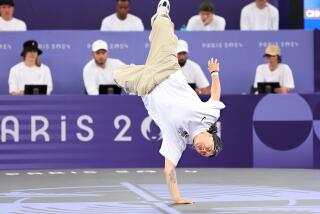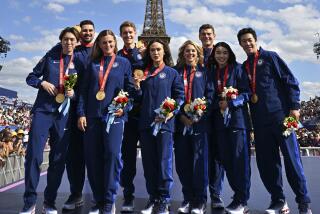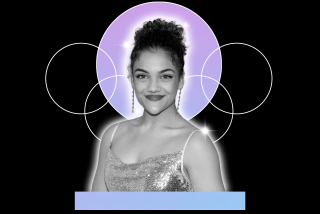FIGURE SKATING U.S. CHAMPIONSHIPS : For Harding, a Day of Firsts and Triples
- Share via
MINNEAPOLIS — With the haunting theme from “Batman” filling the Target Center, Tonya Harding suddenly shifted into overdrive, lifted herself high off the ice and revolved 3 1/2 times. When she came down on her feet, she became the first U.S. woman ever to land the most difficult of six triple jumps, the triple axel.
Pumping her fists over her head in triumph, she smiled broadly and shouted. She could have been Jack Nicholson, as the Joker, saying, “Wait ‘til they get a load of me.”
Instead, the word that came from her mouth was a simple, “Yes!”
Who could argue? Certainly not the judges, who rewarded the 20-year-old former also-ran from Portland, Ore., with her first national figure skating championship Saturday.
One judge even gave her a perfect score of 6.0 for technical merit. No U.S. woman had received a perfect score for technical merit since 1973, when Janet Lynn earned two of them, also at the national championships in Minneapolis.
The rest of Harding’s scores were not so bad, either. She received 5.9s from the other eight judges for technical merit and 5.9s from six of the judges for composition and style.
That relegated Kristi Yamaguchi, the overwhelming favorite from Fremont, Calif., and the leader after Thursday’s original program, to her third consecutive second-place finish, although, considering her superb free skating Saturday, it is not fair to say that she lost.
Harding simply seized the moment and, with it, the title.
Watching in amazement, along with the rest of the crowd of 10,346, was Jill Trenary, the 1989 and 1990 national champion who withdrew from this event because of an ankle injury.
“I was totally impressed with her program,” Trenary said. “I’m a woman skater, so I know how difficult that triple axel was. I was very impressed. That’s all I can say.”
Harding has been working on the triple axel at her Beaverton, Ore., practice rink for four years. No one performed that jump before 1978. The first, and only, woman to do it before Saturday was Japan’s Midori Ito, who landed it twice in 1989. In four competitions before this one, Harding came close to completing it only once.
She decided during practice Thursday that she definitely would include it in her free-skating program here. She could have changed her mind after finishing second in that night’s original program, which counts toward one-third of the total score. She knew that all she had to do Saturday was stay on her feet to finish among the the top three and earn a trip to Munich for next month’s World Championships.
“She took a big risk,” Trenary said. “If you fall on that thing, you disrupt your whole program.”
But Harding told her coach, Jody Teachmann, that she did not want to play it safe. She said she wanted to win.
Teachmann reminded Harding of that after she fell on the triple axel in the five-minute warmup session before the free skating.
“She said, ‘Get your butt up off the ice,’ ” Harding said. “No, just kidding. She said, ‘Just concentrate. You know you can do it.’ ”
Harding returned to the ice for the final minute of the warmups and did the triple axel.
Forty-five seconds into her four-minute program, she did it again, this time for real.
A spontaneous ovation almost drowned out the music. It seemed as if most of the spectators among the unusually knowledgeable crowd for figure skating knew the significance of what they had seen. Or perhaps they merely were impressed with her hang time.
But after the triple axel, what do you do next? Harding still had 3 minutes 45 seconds of a demanding program to complete.
“I thought, ‘Whoa, calm down. I have to do the rest of the program. It’s not just the triple axel,’ ” Harding said.
Indeed, it was not. All six types of triple jumps were included in her program, something no other woman besides Ito has attempted.
No problem. She caught her breath during a piano version of “Send in the Clowns,” then revved up again for a big finish to rapper Tone Loc’s “Wild Thing.”
It was a near-flawless performance.
“Instead of being on the Third Cloud, I was on the Ninth Cloud,” she said.
Even before she finished, the crowd was on its feet to give her a standing ovation. She received another during the award’s ceremony. It was the second time she had been on the victory stand at the national championships. She finished third in 1989, then dropped to seventh last year while trying to skate through a bad case of flu.
Yamaguchi, 19, was still in tears an hour after the award’s ceremony. She said she was disappointed, but what more could she have done? She fell once, on a triple salchow, but, still skated well enough to win on most days. Two of the nine judges even gave her higher marks than Harding.
Yamaguchi said she would return to practice and work on her triple axel.
Not Nancy Kerrigan, the Stoneham, Mass., skater who finished third to earn the final berth on the U.S. team for the World Championships.
Asked if the thought of attempting a triple axel scared her, Kerrigan said, “It’s not scary to me because I’m not doing it.”
Fourth and fifth, respectively, were Tonia Kwiatkowski of Broadview Heights, Ohio and Tisha Walker of Thousand Oaks.
Notes
Dressed as racing cars, Elizabeth Punsalan of Sheffield Lake, Ohio, and Jerod Swallow of Northville, Mich., performing to an Indianapolis 500 theme, won the dance championship Saturday night. They beat April Sargent of Ogdensburg, N.Y., and Russ Witherby of Cincinnati, who finished second for the third consecutive year. Jeanne Miley of West Chester, Pa., and Michael Verlich of Long Beach were third. The first two teams will compete in the World Championships. . . . Joanna Ng of Woodland Hills finished second in girls’ junior singles. John Baldwin of San Diego was the boys’ junior runner-up.
More to Read
Go beyond the scoreboard
Get the latest on L.A.'s teams in the daily Sports Report newsletter.
You may occasionally receive promotional content from the Los Angeles Times.






